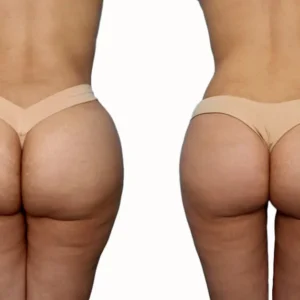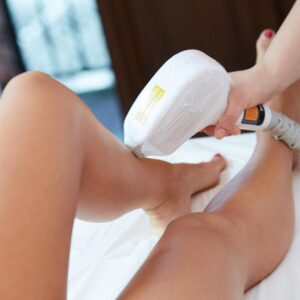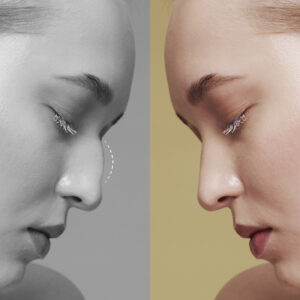Description
Familiarity with treatment
Chin implant surgery, also known as genioplasty, is a procedure that aims to enhance the size, shape, and projection of the chin. Here is a general overview of the procedure:
Consultation: The first step is to schedule a consultation with a qualified plastic surgeon. During this consultation, you will discuss your goals, expectations, and any concerns you may have. The surgeon will evaluate your facial structure, chin proportions, and overall facial harmony to determine the most suitable approach for your desired outcome.
Anesthesia: Chin implant surgery is typically performed under general anesthesia or local anesthesia with sedation. The choice of anesthesia will depend on the surgeon’s recommendation and your preferences.
Incision: The surgeon will make an incision either inside the mouth (intraoral approach) or under the chin (submental approach). The choice of incision location depends on various factors, including the specific technique used and the surgeon’s preference.
Implant Placement: The surgeon will create a pocket in the chin area to accommodate the implant. The implant is typically made of biocompatible materials, such as silicone, and comes in different shapes and sizes. The surgeon will select an implant that best suits your desired outcome and facial proportions. The implant is carefully positioned and secured in place.
Closing Incisions: After the implant is in place, the surgeon will close the incisions with sutures. If the incision was made inside the mouth, the sutures are typically dissolvable and do not require removal. If the incision was made under the chin, the sutures may need to be removed after a certain period of time.
Recovery and Follow-up: After the surgery, you will be monitored in a recovery area until you are ready to go home. It’s important to follow your surgeon’s postoperative instructions, which may include guidelines for pain management, wound care, and activity restrictions. Attend all scheduled follow-up appointments to ensure proper healing and address any concerns or questions you may have.
Who is it suitable for?
Chin implants, or genioplasty, are suitable for individuals who are looking to enhance the appearance of their chin and achieve better facial balance and harmony. Here are some factors to consider when determining if chin implants are suitable for you:
Chin Proportions: Chin implants can benefit individuals with a small or recessed chin, as well as those with an asymmetrical or poorly defined chin. The procedure can help improve the projection, shape, and contour of the chin to achieve a more aesthetically pleasing facial profile.
Facial Balance: Chin implants are often recommended to enhance facial balance and harmony. The chin and nose are two facial features that are closely related in terms of proportions. A small or weak chin can make a larger nose appear more prominent. Chin augmentation can help create a better balance between the chin and other facial features, such as the nose and jawline.
Desired Aesthetic Outcome: If you have specific goals for chin enhancement, such as achieving a more defined or prominent chin, chin implants can be a suitable option. During a consultation with a plastic surgeon, you can discuss your desired outcome and determine if chin implants align with your aesthetic goals.
Good Overall Health: Like any surgical procedure, chin implant surgery requires good overall health. It’s important to disclose any medical conditions, allergies, or medications you are taking to your plastic surgeon during the consultation. They will assess your suitability for the procedure and discuss any potential risks or complications.
Who is it not suitable for?
Chin implants may not be suitable for everyone. Here are some factors to consider when determining if chin implants are not suitable for you:
Medical Conditions: Certain medical conditions or health issues may make you a poor candidate for chin implant surgery. These conditions can include uncontrolled diabetes, autoimmune disorders, bleeding disorders, or active infections. It’s important to disclose your complete medical history to your plastic surgeon during the consultation to determine if you are a suitable candidate for the procedure.
Unrealistic Expectations: It’s important to have realistic expectations about the outcome of chin implant surgery. While the procedure can enhance the appearance of the chin and improve facial balance, it may not completely transform your overall appearance. If you have unrealistic expectations or are seeking drastic changes that may not be achievable through chin implants alone, your surgeon may recommend alternative options or additional procedures.
Insufficient Chin Tissue: In some cases, individuals may have insufficient chin tissue to support an implant. This can occur if you have very thin or weak chin bone structure. In such cases, your surgeon may recommend alternative procedures, such as sliding genioplasty or bone grafting, to achieve the desired chin enhancement.
Active Facial Infections: If you have an active infection in the chin or surrounding areas, it may be necessary to postpone the chin implant surgery until the infection is resolved. This is to minimize the risk of complications and ensure proper healing.
Unstable Mental Health: It’s important to have stable mental health and realistic expectations before undergoing any cosmetic surgery. If you have a history of body dysmorphic disorder or other mental health conditions that may affect your perception of your appearance, your surgeon may recommend additional evaluation or counseling before proceeding with chin implant surgery.
Advantages
Chin implants, or genioplasty, offer several advantages for individuals seeking to enhance the appearance of their chin. Here are some of the benefits associated with chin implants:
Improved Facial Proportions: Chin implants can help create better facial balance and harmony by enhancing the size, shape, and projection of the chin. This can result in a more aesthetically pleasing facial profile and improved overall facial proportions.
Customizable Options: Chin implants come in a wide range of contours and sizes, allowing for customization to suit each patient’s unique facial features and desired outcome. This ensures that the implant chosen is tailored to achieve the desired aesthetic result.
Durable and Permanent Results: Chin implants are made from durable materials, usually silicone, that are biocompatible and designed to be long-lasting. Once the implant is in place, the benefits of chin augmentation are typically permanent, providing a lasting improvement to the chin’s appearance.
Minimally Invasive Procedure: Chin implant surgery is usually performed as an outpatient procedure, either under local anesthesia with sedation or general anesthesia. The incisions are typically made inside the mouth or under the chin, resulting in minimal visible scarring.
Noticeable Changes: Chin augmentation with implants can produce noticeable changes in the chin’s size, shape, and projection. This can help strengthen a weak or underdeveloped chin, create a more attractive jawline, and minimize the appearance of jowls or a double chin.
Complementary Procedures: Chin implant surgery can be combined with other procedures, such as rhinoplasty (nose job) or facial liposuction, to achieve overall facial harmony and balance. This allows for a comprehensive approach to facial enhancement.
Complications
Chin implant surgery, like any surgical procedure, carries potential risks and complications. Here are some of the complications associated with chin implants:
Infection: Although rare, there is a risk of infection following chin implant surgery. To minimize this risk, surgeons use meticulous and sterile techniques during the procedure. If an infection occurs, antibiotics may be prescribed to treat it.
Hematoma: Hematoma refers to internal bleeding that can occur after surgery. It can cause swelling, pain, and discomfort. In some cases, surgical drainage may be necessary to remove the accumulated blood.
Shift in Implant Position: There is a slight risk that the chin implant may shift from its intended position. This can occur due to trauma to the face or improper healing. If the implant shifts significantly, revision surgery may be required to reposition or replace the implant.
Poor Scarring: The incisions made during chin implant surgery are typically small and well-hidden, resulting in minimal visible scarring. However, in some cases, poor scarring may occur, leading to more noticeable or unsightly scars.
Side Effects from Anesthesia: Chin implant surgery is usually performed under general anesthesia or local anesthesia with sedation. While complications related to anesthesia are rare, there is always a small risk of adverse reactions or side effects.
preoperative care
Preoperative care for chin implant surgery is an important step in ensuring a successful procedure and smooth recovery. While specific instructions may vary depending on the surgeon and individual circumstances, here are some general guidelines based on the search results:
Consultation and Evaluation: Schedule a consultation with a qualified plastic surgeon who specializes in chin implant surgery. During this consultation, your surgeon will evaluate your overall health, discuss your goals and expectations, and assess your suitability for the procedure. Be prepared to provide your complete medical history, including any medications, allergies, or previous surgeries.
Smoking and Medications: If you smoke, it is strongly advised to quit smoking at least a few weeks before the surgery. Smoking can impair the healing process and increase the risk of complications. Your surgeon may also ask you to avoid certain medications or supplements that can thin the blood and increase the risk of bleeding during and after surgery.
Lab Tests and Medical Clearance: Your surgeon may request certain lab tests, such as blood tests or imaging studies, to ensure that you are in good health for the procedure. Depending on your medical history, you may also need to obtain medical clearance from your primary care physician or any relevant specialists.
Fasting: Your surgeon will provide specific instructions regarding fasting before the surgery. It is important to follow these instructions carefully to minimize the risk of complications related to anesthesia.
Transportation and Postoperative Care: Since chin implant surgery is typically performed on an outpatient basis, you will need to arrange for someone to drive you home after the procedure. It is also helpful to have someone available to assist you during the initial stages of recovery.
Preoperative Instructions: Your surgeon will provide you with detailed preoperative instructions, which may include guidelines for medication management, skincare, and hygiene. It is important to follow these instructions closely to ensure optimal conditions for surgery and minimize the risk of complications.
Postoperative care
Postoperative care is crucial for a successful recovery after chin implant surgery. While specific instructions may vary depending on the surgeon and individual circumstances, here are some general guidelines based on the search results:
Follow Surgeon’s Instructions: It is important to carefully follow the postoperative instructions provided by your plastic surgeon. These instructions may include guidelines for wound care, medication management, and activity restrictions. Adhering to these instructions will help promote proper healing and minimize the risk of complications.
Manage Discomfort: It is common to experience some discomfort, swelling, and bruising after chin implant surgery. Your surgeon may prescribe pain medication to help manage any discomfort. Applying cold compresses to the area can also help reduce swelling and alleviate discomfort. However, it is important to follow your surgeon’s specific instructions regarding the use of cold compresses.
Protect the Incision Site: If the incision was made inside your mouth, it is important to maintain good oral hygiene to prevent infection. Your surgeon may recommend rinsing your mouth with a prescribed mouthwash or a saltwater solution after meals to keep the area clean. If the incision was made beneath the chin, your surgeon will provide specific instructions for wound care and suture removal.
Avoid Strenuous Activities: It is important to avoid strenuous activities, heavy lifting, and exercise for a certain period of time as advised by your surgeon. Engaging in these activities too soon after surgery can increase the risk of complications and delay the healing process.
Protect from Sun Exposure: Fresh scars are more susceptible to sun damage, which can lead to darkening and delayed healing. It is important to protect the incision area from direct sun exposure by wearing a wide-brimmed hat or using sunscreen with a high SPF.
Attend Follow-up Appointments: Your surgeon will schedule follow-up appointments to monitor your healing progress. It is important to attend these appointments as scheduled and communicate any concerns or questions you may have.






Reviews
There are no reviews yet.